Kayla’s Week 3 Digital Receipt

Notes I took while watching Star Trek Season 2 Episode 9, The Measure of a Man

Tuesdays 5:00-6:15pm | North Academic Center Library 1/301Y [email protected] | (646) 801-1462

Notes I took while watching Star Trek Season 2 Episode 9, The Measure of a Man
In season 2, episode 9 of Star Trek: The Next Generation, Captain Picard was faced with an issue regarding the android that he considers to be his shipmate, Commander Data. In this episode, Data is forced to give up his body, so to say, in the name of science. While he himself and his fellow crewmates alike do not want to give up this valuable asset towards the team, cyberneticist Commander Maddox insists that since Data isn’t sentient, it is therefore not a being and therefore is a property of the ship Enterprise. The episode brings up the question of whether or not artificial intelligence, like Commander Data This episode, although aired years ago could come to be more relevant today than it was back then. That is because as we advance into society, science is accelerating even faster which means soon, androids like Commander Data would become a relaity, no longer science fiction. Now that too brings up the question of do these “machines” who are capable of acting like humans deserve rights like humans. Are they even to be considered humans or are they a race of their own? From the readings of Safiya Umoja Noble in Algorithms of Oppression, Noble brings up the question of racism being enforced upon these androids. Due to the fact that these androids have to be programmed by someone, then there will be an inevitable source of racism, sexism or any type of bias.
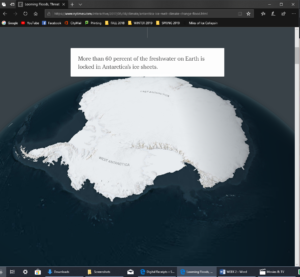
When you start the second series of the article
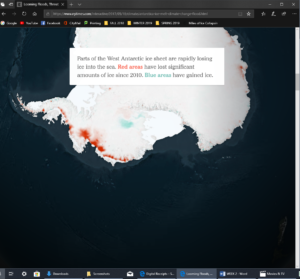
If you continue scrolling, the image changes and now tells you about where in Antarctica thats losing and gaining ice
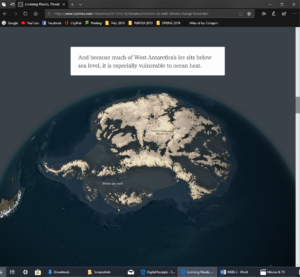
Scroll down more and the visual tells you about the geography of the continent

The visual ends off by emphasizing the importance of finding a solution to this issue
Gillis, Justin, et al. “Miles of Ice Collapsing Into the Sea.” The New York Times, The New York Times, 18 May 2017, www.nytimes.com/interactive/2017/05/18/climate/antarctica-ice-melt-climate-change.html.
On May 18, 2017, The New York Times published three-part series called “Antarctica Dispatches”. In this series, The New York Times takes advantage of the advancement of technology to tell the story of Antarctica, the seventh continent. The first part starts off with a map of the continent and there are moving lines to show how the ice is moving, showing them move towards the Ross Sea. When you read the article itself, you learn that the ice sheets are melting at rate so rapid that scientist are worried that sooner or later, coastal cities would have to seek refuge from their own homes due to rise in sea levels. The article also goes on to explain how scientist are attempting to solve this top priority issue and to show the audience what they mean, a video is provided. The interactive video at the bottom of the article allows the viewer to move the camera around and watch the scientist equipment at work. In the article, the author stresses the importance of scientist to figure out a way to slow down the disintegration of the ice sheets and by using these visuals, this importance is stressed beyond words. The interactivity of this article allows the reader to someone experience the urgency and realize the effects that greenhouse gases have on themselves, indirectly. The visuals also act as a summarizer for the article. For people who don’t always have the time to read the full article, the visuals provided show the issue they talk about in the article following. In part two for example, as the reader scrolls, the geographical makeup of Antarctica is shown and there are short captions to indicate whats happening, acting to consolidate information. I think that this way of presenting information, especially in the STEM filed is effective because often, the information regarding STEM subject is dense and not for everyone but using these interactive ways to engage the reader’s attention can capture a wide variety of audiences.
Gillis, Justin, et al. “Miles of Ice Collapsing Into the Sea.” The New York Times, The New York Times, 18 May 2017, www.nytimes.com/interactive/2017/05/18/climate/antarctica-ice-melt-climate-change.html.
Authors Elizabeth Losh and Jonathan Alexander are both experienced in teaching about the art of writing. In the comic in which they contributed to, “Understanding Rhetoric A Graphic Guide to WRITING”, they are teaching the reader about the deceptive connotation it possesses, and the history behind it. Losh and Alexander have stated on page 36 that rhetoric has a bad reputation because it’s often used in regard to politics and how politicians always use rhetoric to lie their way into office. I agree with this point because when I first was introduced to rhetoric, it seemed as if it was a way for people to sugar coat what they really were trying to say in their writing and trick the readers into agreeing with their point. However, upon learning more about rhetoric, I learned that rhetoric is a way to write to strengthen the argument. By using logos, pathos, and ethos, the author is using methods to show that the argument has a point and why its logical to agree. Losh and Alexander have also showed throughout the comic the orgins of rhetoric. Dating back to Ancient Greece when Plato believed that rhetoric was a way to lie about the truth to today when people use rhetoric everywhere without even realizing- on online profiles, for example. Losh and Alexander have introduced me to kairos, the opportunity for speaking meaning that it is important to know the appropriateness and the timing of having a voice on the topic. I am in agreement with this point because one should consider the long-term effect of voicing their opinion. Are they responding to the topic because everyone else is or is it for a purpose? An example of this would be the travel bans enacted by President Trump. Many have voiced their opinion on this topic and in this case, the topic will be brought up constantly and its one that someone will always have an argument for.
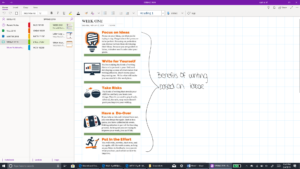
Why Grading Based on Labor is Better than the “Traditional” Way
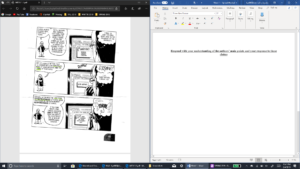
Looking At My Annotations on the Comic and Writing The Weekly Response